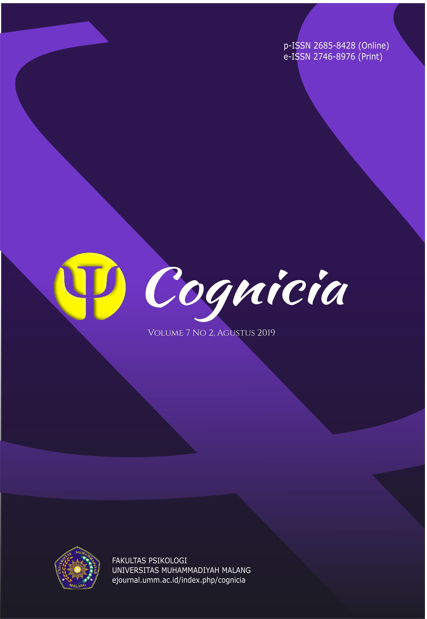Hubungan antara dukungan emosional orangtua dan agresivitas remaja dengan orangtua bercerai
DOI:
https://doi.org/10.22219/cognicia.v7i2.9205Keywords:
Parental Emotional Support, Aggressiveness, Adolescent, DivorceAbstract
The emergence of aggressive behavior in teenagers can occur due to various factors, the family is one important aspect that is allegedly associated with the pattern adolescent aggressive behavior. The role of parents to adolescent aggressive behavior by providing emotional support needed to suppress aggressive behavior in adolescents themselves. The purpose of this study was to investigate the relationship between emotional support of parents and the aggressiveness of adolescents with divorced parents. The sampling technique used purposive technique with a subjects were 113 boys and girls with divorced parents aged 12 to 22 years, and lived with one parent. This research instruments using Agression Questionnair scale and the scale of parental emotional support made by the author based on aspects of emotional support by Thoits 1986 with data analysis using SPSS 21. The results show the value of (r) of -0.327 with p 0.000 < 0, 05. It shows that there is a significant negative correlation between parental emotional support and aggressiveness of adolescents with divorced parents. Parental emotional support’s contribution to adolescents with divorced parents aggressiveness of 10.7% (r2 = 0.107)Downloads
References
American Psychology Association (APA). (2000). Child of Disvorce. Diakses dari https://www.apa.org/news/press/releases/2000/07/child-of-divorce.aspx
Ali, M & Asrori, M. (2009). Psikologi remaja. Jakarta: Bumi Aksara
Azwar, S. (2013). Penyusunan Skala Psikologi. Yogyakarta: Pustaka Pelajar.
Boudreault-Bouchard, A. M., Dion, J., Hains, J., Vandermeerschen, J., Laberge, L., & Perron, M. (2013). Impact of parental emotional support and coercive control on adolescents’ self-esteem and psychological distress: Results of a four-year longitudinal study. Journal of Adolescence, 36(4), 695–704.
Buss, A.H., & Perry, M. (1992). The Aggression Questionnaire. Journal of Personality and Social Psychology, 63, 452-459.
Chaplin, J.P. (2009). Kamus Lengkap Psikologi. (Terj. Kartono, K). Jakarta: PT.Raja Grafindo Persada
Dariyo, A. (2004). Memahami Psikologi Perceraian dalam Keluarga. Jurnal Psikologi, Vol 2, No. 2
Dayakisni, Tri., & Hudaniah. (2012). Psikologi sosial. Malang: UMM Press.
Friedman, M. 2010. Buku Ajar Keperawatan keluarga : Riset, Teori, dan Praktek. Edisi ke-5. Jakarta: EGC
Guo, J., Mrug, S., & Knight, D. C. (2017). Emotion socialization as a predictor of physiological and psychological responses to stress. Physiology & Behavior, 175, 119–129.
HETHERINGTON, E. M., COX, M., & COX, R. (1985). Long-Term Effects of Divorce and Remarriage on the Adjustment of Children. Journal of the American Academy of Child Psychiatry, 24(5), 518–530.
Kartono,K. (2011). Psikologi anak. Bandung: Mandar Ma
Kulsum, M. J. (2014). Pengantar Psikologi Sosial. Jakarta: Prestasi Pustaka.
Kurniawati, Y. (2010). Hubungan bermain game online terhadap perilaku agresif remaja. Naskah tidak dipublikasikan, Fakultas Psikologi, Universitas Katolik Soegijapranata, Semarang
Mu'arifah, A. 2005. Hubungan Kecemasan dan Agresifitas. Yogyakarta. Fakultas. Psikologi Universitas Ahmad Dahlan
Myers, D. G. (2010). Psikologi sosial. edisi 10 buku i. Jakarta: Salemba Humanika.
Nisfiannoor, M. (2005). Perbandingan Perilaku Agresif Antara Remaja Yang Berasal Dari Keluarga Bercerai Dengan Keluarga Utuh. Jurnal Psikologi, Vol.3, No.1
Regional kompas. (2018). Murid yang haja gurunya dengan kursi berasal dari keluara broken home. Diakses dari https://regional.kompas.com/read/2018/03/10/06382121/murid-yang- hajar- gurunya dengan-kursi-berasal-dari-keluarga-broken-home
Sanstrock. J,W. (2012). Life Span Development. Edisi ke-13 jilid I: Penerbit Erlangga
Sarafino, E. P. (2007). Health psychology biopsychosocial interactions (ed. 6). Canada : John Milley and Sons Inc.
Sugiyono. (2015). Metode Penelitian Kuantitatif Kualitatif R&B. Bandung: Aflabeta
Untari, I., Putri, K. P. D., & Hafiduddin, M. (2018). Dampak Perceraian Orang Tua Terhadap Kesehatan Psikologis Remaja. Profesi (Profesional Islam) : Media Publikasi Penelitian, 15(2), 106.
VandenBos, G. R. (ed.). (2007). APA Dictionary of Psychology. Washington DC: American Psychological Association.
Willis, S & Sofyan. (2005). Remaja dan Masalahnya. Bandung: CV.Alfabeta
Winarsu, Tulus. (2012). Statistik dalam penelitian Psikologi & Pendidikan. Malang: UMM Press.
Wulandari, Vani,. Nunung Nurwati. (2018). Hubungan Kekerasan Emosional Yang Dilakukan Oleh Orangtua Terhadap Perilaku Remaja. Prosiding Penelitian & Pengabdian Masyarakat Universitas Padjajaran. Vol 5, No.2
Yusuf, Syamsu. 2010. Psikologi Perkembangan Anak dan Remaja. Bandung : PT Remaja Rosdakarya.
Downloads
Published
How to Cite
Issue
Section
License
Copyright (c) 2019 Dita Ridho Saqinah, Siti Suminarti Fasikhah, U'un Zulfiana

This work is licensed under a Creative Commons Attribution-ShareAlike 4.0 International License.
Authors who publish with Jurnal Cognicia agree to the following terms:
- For all articles published in Jurnal Cognicia, copyright is retained by the authors. Authors give permission to the publisher to announce the work with conditions. When the manuscript is accepted for publication, the authors agree to automatic transfer of the publishing right to the publisher.
- Authors retain copyright and grant the journal right of first publication with the work simultaneously licensed under a Creative Commons Attribution-ShareAlike 4.0 International License that allows others to share the work with an acknowledgment of the work's authorship and initial publication in this journal.
- Authors are able to enter into separate, additional contractual arrangements for the non-exclusive distribution of the journal's published version of the work (e.g., post it to an institutional repository or publish it in a book), with an acknowledgment of its initial publication in this journal.
- Authors are permitted and encouraged to post their work online (e.g., in institutional repositories or on their website) prior to and during the submission process, as it can lead to productive exchanges, as well as earlier and greater citation of published wor (See The Effect of Open Access).

This work is licensed under a Creative Commons Attribution-ShareAlike 4.0 International License







